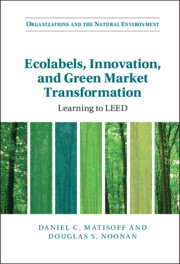Book contents
- Ecolabels, Innovation, and Green Market Transformation
- Organizations and the Natural Environment
- Ecolabels, Innovation, and Green Market Transformation
- Copyright page
- Dedication
- Contents
- Figures
- Tables
- Preface
- 1 Advancing a Perspective of Green Market Transformation
- 2 The Architecture of Green Building Policies and Practice
- 3 Choose Your Own Adventure!
- 4 The Labeling Building Challenge
- 5 The Public and Private Benefits of Green Building
- 6 Tossing a Pebble in a Pond
- 7 Demonstrating Innovation in Green Buildings
- 8 Keep Raising the Bar
- 9 It’s Not Easy Being Green
- 10 A Blueprint for Green Market Transformation
- 11 Conclusions
- Index
- References
8 - Keep Raising the Bar
Green-lighting a Race to the Top!
Published online by Cambridge University Press: 27 October 2022
- Ecolabels, Innovation, and Green Market Transformation
- Organizations and the Natural Environment
- Ecolabels, Innovation, and Green Market Transformation
- Copyright page
- Dedication
- Contents
- Figures
- Tables
- Preface
- 1 Advancing a Perspective of Green Market Transformation
- 2 The Architecture of Green Building Policies and Practice
- 3 Choose Your Own Adventure!
- 4 The Labeling Building Challenge
- 5 The Public and Private Benefits of Green Building
- 6 Tossing a Pebble in a Pond
- 7 Demonstrating Innovation in Green Buildings
- 8 Keep Raising the Bar
- 9 It’s Not Easy Being Green
- 10 A Blueprint for Green Market Transformation
- 11 Conclusions
- Index
- References
Summary
This chapter argues that participation in voluntary programs can facilitate ongoing quality competition, enabling a race. It advances a theory of self-regulatory competition that may sustain this race. From this perspective, programs can be designed to facilitate a race to the top despite tendencies for label managers to compete for the lowest common denominator or for firms to greenwash and strategically overrepresent their environmental performance. Building on the premise underpinning demonstration projects improving supply chains and facilitating uptake of new technologies, it highlights how ecolabel programs can help transform markets. Once a market becomes crowded, new standards can be set, raising the bar for building performance. Data from the LEED program demonstrate that, over time, organizations and especially private firms invest additional resources to attain higher certification tiers, becoming greener as part of a race to the top in a voluntary, green building certification program.
Keywords
- Type
- Chapter
- Information
- Ecolabels, Innovation, and Green Market TransformationLearning to LEED, pp. 210 - 234Publisher: Cambridge University PressPrint publication year: 2022

